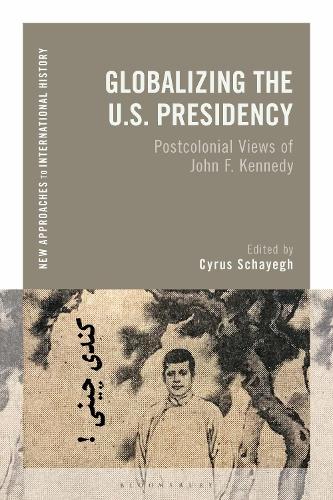
Globalizing the U.S. Presidency: Postcolonial Views of John F. Kennedy
(Paperback)
Publishing Details
Globalizing the U.S. Presidency: Postcolonial Views of John F. Kennedy
By (Author) Cyrus Schayegh
Bloomsbury Publishing PLC
Bloomsbury Academic
29th July 2021
29th July 2021
United Kingdom
Classifications
Tertiary Education
Non Fiction
Colonialism and imperialism
International relations
327.73009046
Physical Properties
Paperback
256
Width 154mm, Height 232mm, Spine 18mm
460g
Description
Using John F. Kennedy as a central figure and reference point, this volume explores how postcolonial citizens viewed the US president when peak decolonization met the Cold War. Exploring how their appropriations blended with their own domestic and regional realities, the chapters span sources, cases and languages from Latin America, Africa, Asia and Europe to explore the history of US and third world relations in a way that pushes beyond US-centric themes. Examining a range of actors, Globalizing the U.S. Presidency studies various political, sociocultural and economic domestic and regional contexts during the Cold War era, and explores themes such as appropriation, antagonism and contestation within decolonisation. Attempting to both de-americanize and globalize John F. Kennedy and the US Presidency, the chapters examine how the perceptions of the president were fed by everyday experiences of national and international postcolonial lives. The many examples of worldwide interest in the US president at this time illustrate that this time was a historical turning point for the role of the US on the global stage. The hopes and fears of peaking decolonization, the resulting pressure on Washington, Moscow and other powers, and a new mediascape together ushered in a more comprehensive globalization of international politics, and a new meaning to the United States in the world.
Reviews
This wide-ranging and important collection sheds light on the global significance of John F. Kennedys presidency. A remarkable variety of essays, expertly curated, capture the power and complexity of the Kennedy brand by considering the ways in which it was interpreted, repackaged and re-purposed throughout the postcolonial world. Highly recommended. * Thomas Tunstall Allcock, Lecturer in American History, University of Manchester, UK *
John F. Kennedy is a global icon. This collection provides rich and fascinating insights into how JFK was seen and appropriated across the globe. Many Kennedys, some familiar, others less, emerge from its pages, shedding new light on US imperial-postcolonial relations during the 1960s. * Kiran Klaus Patel, Professor of History, Ludwig Maximilian University, Germany *
Within the vast corpus of books devoted to US President John F. Kennedy, this volume is unique. Schayegh has assembled a stellar cast of scholars to probe how JFK resonated in the postcolonial world and what he (and, by extension, the United States) meant to people there from all walks of life. The result is an illuminating volume packed with lively characters and trenchant analysis that should be read by anyone interested in the postcolonial world in the 1960s and its relationship to US power. * Erez Manela, Professor of History, Harvard University, USA *
Author Bio
Cyrus Schayegh is Professor of International History at the Graduate Institute of Geneva, Switzerland. He was previously Associate Professor at Princeton University, USA, and in 2005-2008, Assistant Professor at the American University of Beirut, Lebanon. His current research focuses mainly on the interplay between post-war globalisation and decolonisation, Arab views of Afro-Asian decolonisation, interwar European inter-imperial cooperation, and historiography.
